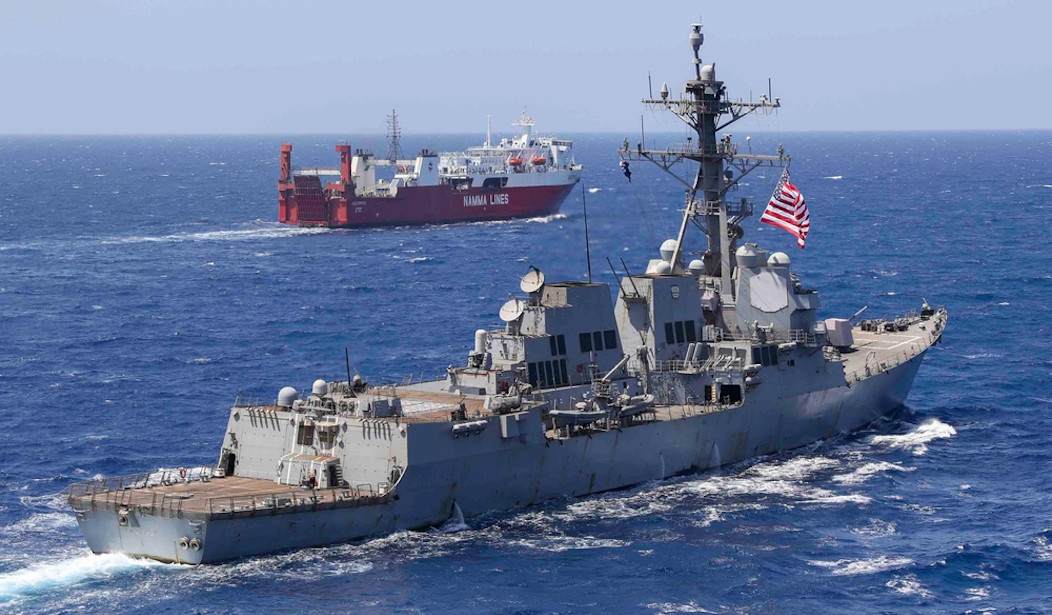Red Sea Security Coalition Melts Down As Member Nations Refuse to Accept US Leadership
The Biden White House's grand idea for an international coalition to protect 10 percent of the world's shipping from the threat posed by a primitive Third World nation seems to be on the verge of a meltdown over the issue of American leadership of the operation. On Friday, I reported that France had withdrawn from Operation Prosperity Guardian, which was to be a US-led multinational coalition with the mission of keeping the Red Sea, and particularly the Bab el-Mandeb Strait, open to international shipping; see Biden's Plan to Safeguard Red Sea Trade From Houthis May Match Afghanistan in Incompetence. Since then, Italy and Spain have announced they will not participate in a US-led operation.
Membership in Operation Prosperity Guardian has always been somewhat suspect. In Defense Secretary Lloyd Austin's statement on the formation of the alleged coalition, he publicly identifies 10 members: the United States, United Kingdom, Bahrain, Canada, France, Italy, Netherlands, Norway, Seychelles, and Spain. In a follow-up press conference, Pentagon spokesman USAF Major General Pat Ryder claimed the coalition was growing.
There have been solid results: To date more than 20 nations have signed on to participate, Ryder said. "In the days ahead, the United States will continue to consult closely with our allies and partners who share the fundamental principle of freedom of navigation, and we expect to see the coalition continue to grow," he said.
The fact that Egypt, whose revenue from the Suez Canal is totally dependent on Red Sea traffic, refused to join served as a warning flare about the troubles that lay ahead. Another warning sign was Bahrain being the only Arab state to participate and about half of the alleged participants refusing to be publicly identified.
Original Coalition Members
For your convenience, the coalition members not sending ships are in italics.
United Kingdom — The UK will contribute one Type 45 destroyer, HMS Diamond. Four other destroyers are in the theater of operations but will not be a part of Operation Prosperity Guardian.
Bahrain — no one seems quite sure what, if anything, Bahrain is contributing.
Canada — Canada will send three staff officers.
France — The multirole frigate Languedoc will be in the operational area, but it will remain under French command.
Italy — Italy is sending the Bergamini/FREMM class frigate Virginio Fasan "to protect its national interests in response to specific requests made by Italian shipowners."
Netherlands — The Netherlands will send two staff officers.
Norway — Norway will send 10 staff officers.
Seychelles — Seychelles will share information but will not provide physical assets or men.
Spain — Spain will only participate in EU or NATO-led operations. It has not sent ships to the area.
New Members
Greece — Greece is sending one frigate to participate in Operation Prosperity Guardian.
Australia — Australia was asked to contribute naval assets; they are sending 11 staff officers.
Denmark — Denmark is sending one staff officer.
European Union
The European Union announced it would lend a hand.
As it turns out, EU Naval Force Atalanta is an anti-piracy operation focused on the Horn of Africa. Right now, it consists of two ships from Italy and Spain. The Italian ship is the same one I mentioned above. I am going to make a leap here and assume the Spanish ship will remain on the Horn of Africa.
So, this is participation via an "X" message.
The final box score shows that the 20 coalition members will contribute a total of two surface combatants.
In his last testimony to the House Armed Services Committee, former Chief of Naval Operations Michael Gilday noted 17 times how vital "allies and partners" are to the ability of the US Navy to perform its missions. In fact, every time Gilday was called to task over obvious shortcomings in the Navy's abilities, he would trot out the shibboleth of how our "allies and partners" would fill whatever gap the Navy had neglected as it focused on its core mission of recruiting a sexual menagerie (Rum, Buggery, and the Lash Makes a Comeback as the US Navy Fights Recruiting Woes; Well, Better Hold the Rum).
Now, when the chips are down, we see that our "allies and partners" have figured out what the rest of us have. The US is an erratic, unstable, and unreliable ally. It will abandon you at the drop of a hat. It will do profoundly stupid stuff without a second thought. American military leadership is so weak and feeble that you need to think twice about placing your men and ships under American command.
On the whole, I think we can safely say that Joe Biden has fully implemented Barack Obama's "lead from behind" strategy. Our military is so physically weak that it can't do some missions alone and is perceived as so incompetent that no one cares to follow us.





Post a Comment